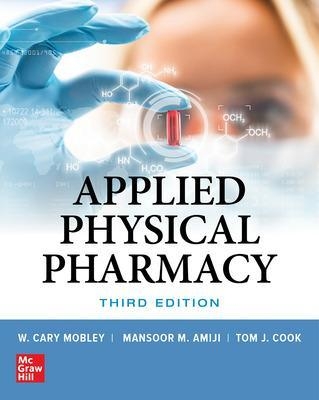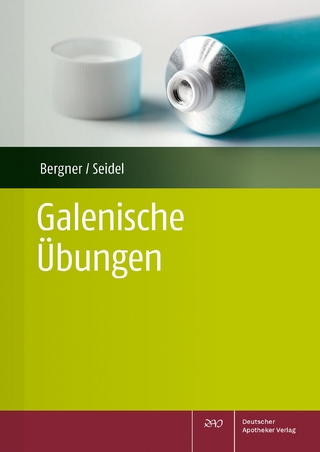
Applied Physical Pharmacy, Third Edition
McGraw-Hill Education (Verlag)
978-1-260-45221-1 (ISBN)
A complete practice-oriented introduction to physical pharmacy
Written to clearly and simply explain how drugs work, this textbook explores the fundamental physicochemical attributes and processes important for understanding how a drug is transformed into a usable product that is administered to a patient to reach its pharmacological target, and then exists the body.
Applied Physical Pharmacy, Third Edition begins with a review of the key biopharmaceutics concepts of drug liberation, absorption, distribution, metabolism, and excretion. These concepts, and others, set the framework for the subsequent chapters that describe physicochemical properties and process related to the fate of the drug. Other physical pharmacy topics important to drug formulation are discussed in the chapters that follow, which describe dispersal systems, interfacial phenomena, and rheology. The textbook concludes with an overview of the principles of kinetics that are important for understanding the rates at which many of the processes discussed in previous chapters occur.
Chapters in this Third Edition retain the acclaimed learning aids of previous editions, including Learning Objectives, Practice Problems, Key Points, and Clinical Questions. In order to be of greater value to the pharmacy student, more clinical questions have been added, and many tables have been updated with more current products and excipients.
McGraw-Hill authors represent the leading experts in their fields and are dedicated to improving the lives, careers, and interests of readers worldwide
Contributors
Preface
1. Introduction to Biopharmaceutics
Introduction
Drug Disposition—The Fate of the Drug After Administration
Ladme
Conclusion
Key Point
Clinical Questions
2. States of Matter Related to Pharmaceutical Formulations
Introduction
Intermolecular Forces
States of Matter
Stability of Solids
Acknowledgment
Problems
Answers
Key Points
Clinical Questions
Appendix
3. Physical Properties of Solutions
General Considerations
Concentration Expressions
Classification of Aqueous Solution Systems
Physical Properties of Solutions
Physiologic Applications of Colligative Properties
Isotonic Solutions
Sodium Chloride Equivalent Values (E)
Problems
Answers
Key Points
Clinical Questions
Appendix
4. Ionic Equilibria and Buffers
Electrolytes Versus Nonelectrolytes
Importance of Ionization in Pharmacy
Acids and Bases
Ionization of Water
Ionization of Electrolytes
Ionization of Salts
Buffers
Ionization of Amphoteric Electrolytes
Ionization of Polyprotic Acids
Activity and Activity Coefficient
Acid–Base Titration and Titration Curve
Problems
Answers
Key Points
Clinical Questions
Appendix
Suggested Readings
5. Solubility, Dissolution, and Partitioning
Solubility
Dissolution
Dissolution of Particles
Factors Affecting Drug Dissolution
Partitioning
Solubility Problems
Answers
Dissolution Problems
Answers
Partitioning Problems
Answers
Key Points
Clinical Questions
Appendix
6. Mass Transport
Introduction
Transport Systems
Diffusion Through a Membrane
Significance of Diffusion
Significance of Osmosis
Problems
Answers
Key Points
Clinical Questions
7. Complexation and Protein Binding
Introduction
Types of Complexes
Metal–Ion Coordinate Complexes
Cyclodextrin Complexes
Ion-Exchange Resins
Protein–Ligand Interactions
Plasma Protein Binding
Problems
Answers
Key Points
Clinical Questions
Appendix
8. Dispersed Systems
Dispersed Systems Classified by Their Phases
Dispersed Systems Classified by Their Particle Size
Physical Stability of Dispersed Systems
Summary
Problems
Answers
Key Points
Clinical Questions
Suggested Readings
9. Interfacial Phenomena
Surface Tension
Electrical Double Layer
Adsorption
Problems
Answers
Key Points
Clinical Questions
Appendix
10. Rheology
Introduction
Newtonian Flow
Viscosity of Newtonian Fluids
Effect of Temperature on Viscosity
Non-Newtonian Flow
Thixotropy
Viscoelasticity
Significance of Rheology
Viscosity Modifiers
Problems
Answers
Key Points
Clinical Questions
Appendix
11. Chemical Kinetics of Pharmaceuticals
Common Drug Degradation Reactions
Order of Reaction
Determination of the Order of a Reaction
Stability and Shelf-Life of Drugs
Enzyme Catalysis Reactions
Pharmacokinetics: An Extension of Reaction Kinetics
Problems
Answers
Clinical Questions
Suggested Readings
Appendix: Basic Mathematical Concepts
Equations
Logarithmic Function
Exponential Function
Differentiation and Integration Functions
Bibliography
Mathematical Tables
Endnotes
Index
| Erscheinungsdatum | 04.06.2019 |
|---|---|
| Zusatzinfo | 20 Illustrations |
| Verlagsort | OH |
| Sprache | englisch |
| Maße | 183 x 244 mm |
| Gewicht | 626 g |
| Themenwelt | Medizin / Pharmazie ► Pflege |
| Medizin / Pharmazie ► Pharmazie ► PTA / PKA | |
| ISBN-10 | 1-260-45221-2 / 1260452212 |
| ISBN-13 | 978-1-260-45221-1 / 9781260452211 |
| Zustand | Neuware |
| Informationen gemäß Produktsicherheitsverordnung (GPSR) | |
| Haben Sie eine Frage zum Produkt? |
aus dem Bereich


